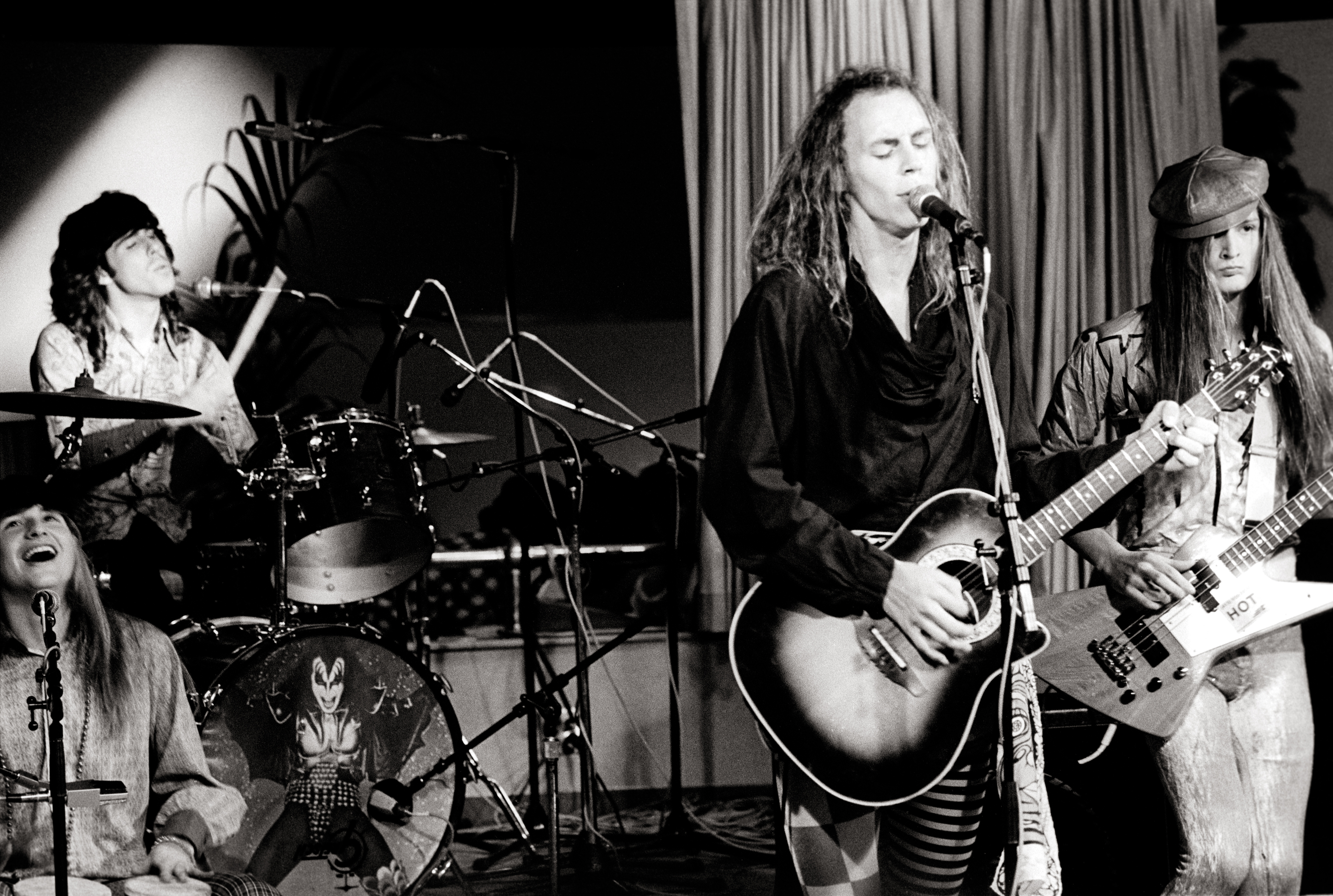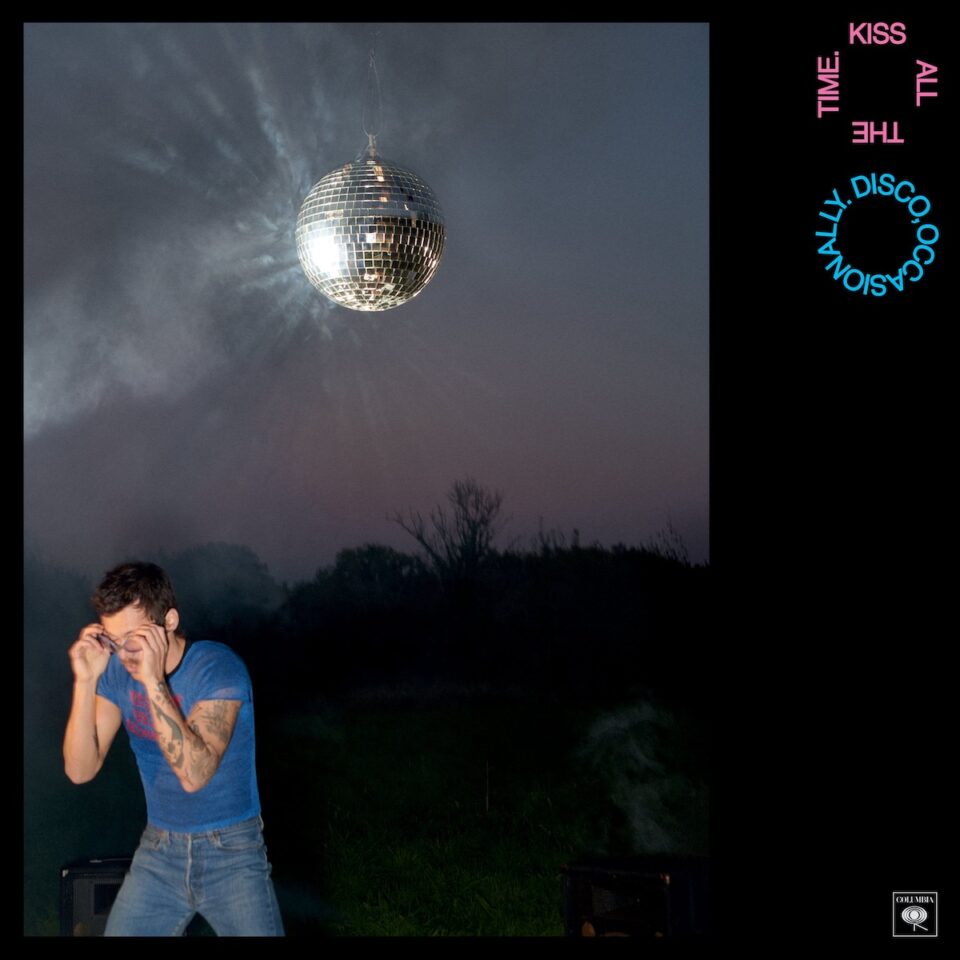Forty-five years after playing their first live gig, Jeff and Steven McDonald are enjoying the greatest year in the history of Redd Kross. In addition to the release of their 10th album—the invigorating double LP Redd Kross, a.k.a. “The Redd Album”—2024 has seen the Southern Californian band playing to packed houses and rave reviews across the US, UK, and Europe, while Andrew Reich’s long-awaited documentary Born Innocent: The Redd Kross Story is finally seeing national distribution via Abramorama Films. And now, on October 29, Omnibus Press will be publishing their enlightening new autobiography, Now You’re One of Us: The Incredible Story of Redd Kross.
Told in an oral history format by the McDonald brothers with help from journalist/author Dan Epstein— whose June 2022 FLOOD interview with Steven about the 35th anniversary of their classic 1987 album Neurotica kick-started the book project—Now You’re One of Us recounts their wild, improbable journey from pop-culture-obsessed weirdos in Hawthorne, California to massively influential cult band, with stops in the LA punk, hardcore, glam, underground, and alternative rock scenes along the way.
In this exclusive excerpt from Now You’re One of Us, Jeff and Steven recall getting together with Robert Hecker—the lead guitarist for their much-loved Neurotica and Third Eye albums—and playing the Gila Monster Jamboree, the now-legendary 1985 show in the Mojave Desert that also featured Sonic Youth, Meat Puppets, and Perry Farrell’s pre-Jane’s Addiction outfit Psi-Com, which is now considered the earliest incarnation of what eventually became the Coachella Festival.
Read the excerpt below, and pre-order Now You're One of Us here.
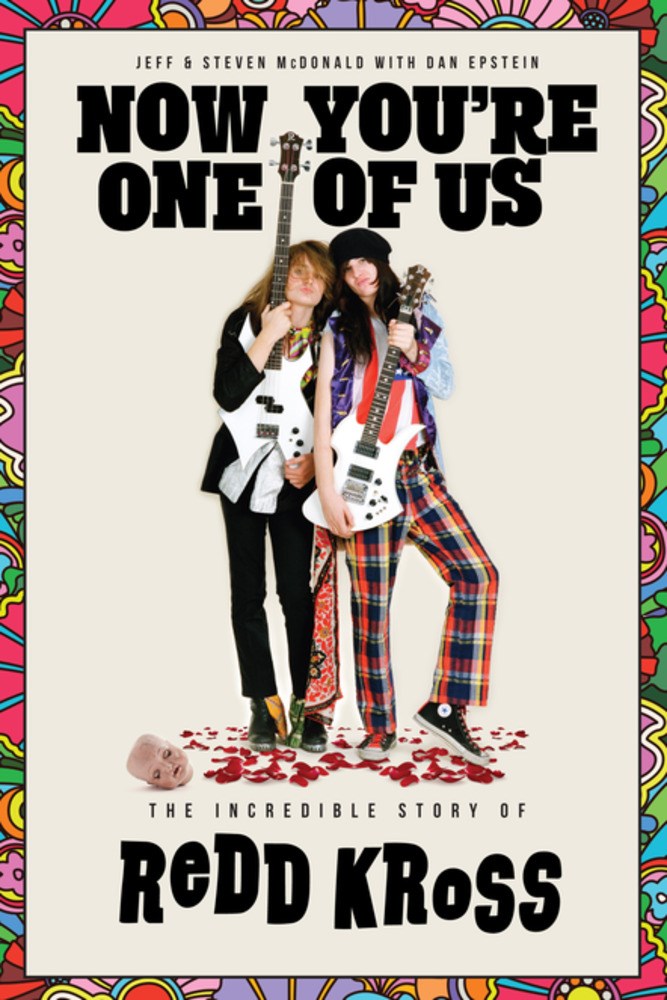
In late 1984, Redd Kross re-expanded to a four-piece with the addition of lead guitarist Robert Hecker. A record-setting track star in high school, Hecker applied the same rigorous intensity to practicing and playing guitar, and his slim frame, eccentric sense of humor and granular knowledge of both The Beatles and KISS catalogues almost made him seem like a long-lost third McDonald brother.
JEFF: I’d done all the guitars on Teen Babes, but we knew that we wanted to have another guitar player, because it was going to be hard to sing and play everything live. We’d met Robert Hecker through the South Bay scene—he’d gone to high school with Janet Housden and Bill and Frank from the Descendents—but we didn’t really know him that well.
STEVEN: He’d grabbed our attention because he never conformed to the hardcore code of having short hair. He was always this crazy hippie dancing wildly at the Black Flag show, and we were like, "That guy is a real freak!" And when he put on his guitar, he was amazing.
JEFF: Robert came over to our house to audition. He lived in Hermosa Beach, and he rode his bicycle the entire way—which is like five or six very hilly miles—with his Gibson SG strapped on his back. He walked into my bedroom and just started playing our version of "Deuce"’ without even plugging in; he was dancing wildly, jumping up and down on the bed, just full- on performance mode. It was the best audition ever, and we didn’t even think about anyone else.
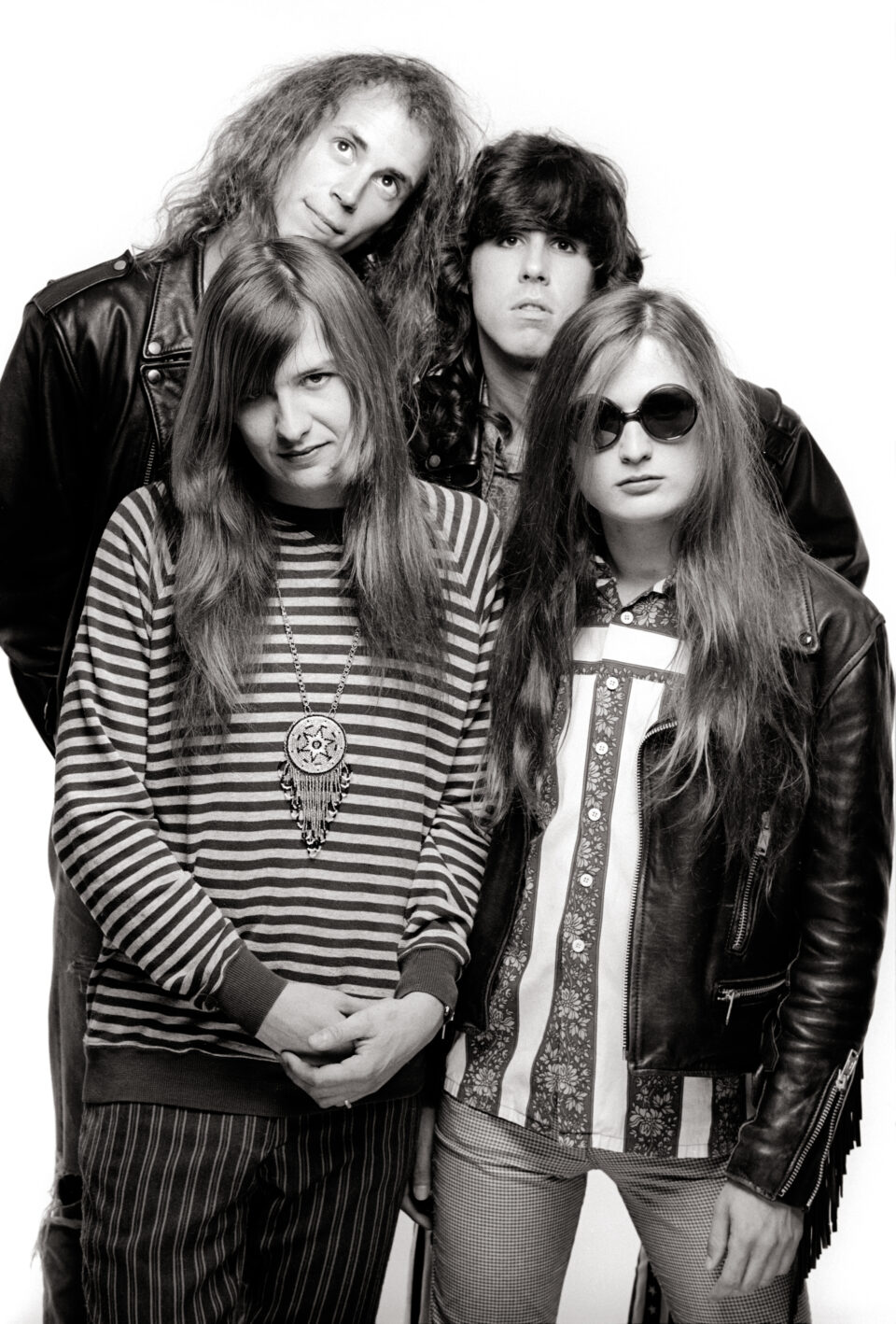
“[Robert Hecker] grabbed our attention because he never conformed to the hardcore code of having short hair. He was always this crazy hippie dancing wildly at the Black Flag show, and we were like, ‘That guy is a real freak!‘” —Steven McDonald
STEVEN: Robert is a real character, and definitely his own person; he always had this really hardcore hippie thing going on. He’s one of those guys that you would think was completely out of his mind on psychedelics but has never even, like, had a sip of coffee his entire life. He was just naturally straight edge, and extremely judgmental of any drug-taking behavior.
JEFF: We were in a very insane, druggie, crazed party state at the time, and he had never tasted alcohol or taken a drug in his life. But he was by far the most eccentric and crazed person that we had ever met, so it was perfect. We connected on just about everything other than chemicals. We were both heavily into The Beatles and KISS on a nerdy level, and we could go down these deep rabbit holes on them where other people would have no idea what we were talking about. And Robert also liked to gossip; our rehearsals would often go on and on where we’d be gossiping about, like, Perry Farrell or Bret Michaels.
STEVEN: Robert’s maybe a year younger than Jeff, but he didn’t get hip to KISS until the Creatures Of The Night album—the same album that Bill Bartell took us to the press conference for. His love of '80s KISS just seemed so eccentric and bizarre to us; I think we would have preferred it if Robert had been an Ace Frehley obsessive, and we were probably horribly withholding with him at times because he didn’t play like Ace at all. But Robert completely worshipped Paul Stanley, especially the high notes that Paul would hit on, like, "I Was Made For Loving You." So at least we had the good sense to realize, "Robert’s obsessed with Paul—let’s run with it!" If things were going really poorly at a show, we would break into that song, or "God of Thunder." If you heard "God of Thunder" at one of our shows, that meant something was going really wrong.
JEFF: We had so many crazy gigs with Robert, like the Gila Monster Jamboree, which was just maybe a month or two after he joined. It was this concert at a secret location out in the middle of the Mojave Desert; it was put on by Desolation Center, which was an arts collective that some of the early Goldenvoice people were involved with. Sonic Youth and Meat Puppets were also on that bill, along with Psi-Com, Perry Farrell’s pre-Jane’s Addiction band.
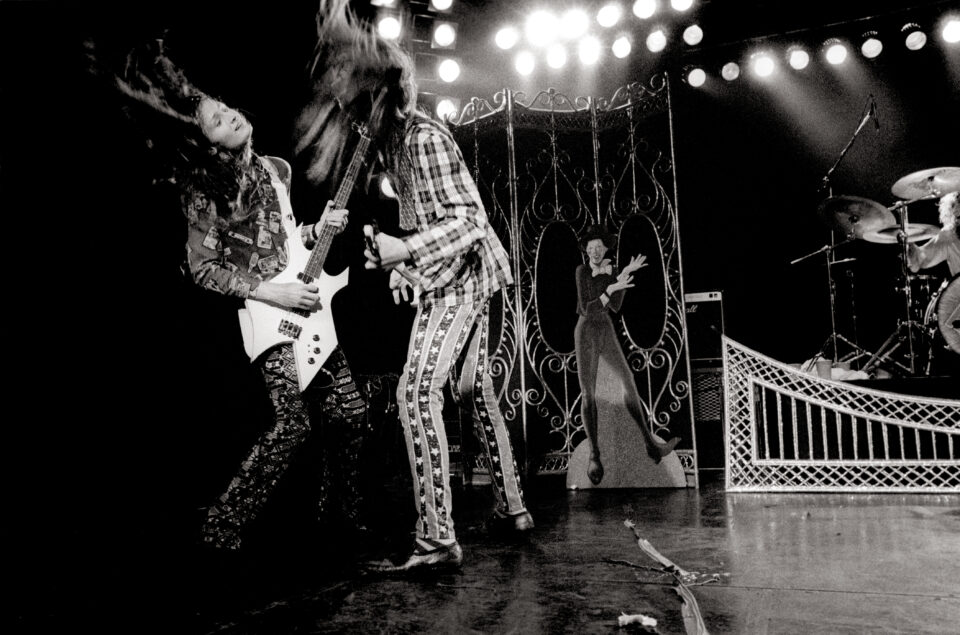
Steven McDonald and Jeffrey McDonald, Variety Arts Center, Downtown Los Angeles, California. 23 September 1988.
STEVEN: We had a manager at the time named Carmel Moran, and she was in with the Desolation Center people and they were in with the Sonic Youth people. I think that was Sonic Youth’s first West Coast tour. That’s when we became friends with them – I remember they borrowed our gear for some LA shows.
JEFF: We had a big show in San Francisco that weekend, and I remember one of the Gila Monster organizers telling us, "We’ll have someone pick you up at the airport, we’ll have gear for you, blah blah blah," because we weren’t able to fly with amplifiers; we just had our guitars. So we do our show in San Francisco, fly in to the Ontario Airport with no sleep, and some punk girl picks us up in like a 1968 Ford jalopy. And she was nice enough, but she got us so insanely lost in the desert that we didn’t get to the secret location until well into the night’s festivities.
STEVEN: We were driving back and forth on these unmarked desert roads, looking for some kind of paper-plate sign on the side of the road with an arrow on it to tell us which dirt road to go down next. The sun went down, and we were still driving around for hours. It finally looked like we were about to run out of gas, and that we were gonna have to resort to cannibalism or die, but we eventually made it there. And the rumor was that we had purposely stalled so that we didn’t have to open for the Meat Puppets. I mean, we were very competitive, and it was a fair accusation—but it was not the case.
JEFF: It was the middle of winter, so it was freezing cold, and our guitars would not stay in tune. And by this time the promoters were gone, everyone was on acid, there weren’t any amplifiers for us, and the Meat Puppets wouldn’t let us use their gear because they thought we showed up late on purpose. So we cobbled together some gear, but there was no stage—we were standing on raw dirt, so every time we moved it was like Pigpen from Peanuts, with big clouds of dust billowing around us. The guitar I used that night still has dirt in it from that show.
STEVEN: It was kind of the opposite of the Madame Wong’s show where we were on acid and nobody else was; this time we were the only ones who weren’t on acid. We jammed it out the best we could, but all I could think about was that it was freezing cold, this girl with the mohawk nearly killed us all, and what the hell was Carmel Moran thinking when she booked this show for us?
JEFF: There was no heat, no firewood, no water, no food, no bathroom facilities, and the buses that everyone had taken out to the desert were just rickety old school buses. I managed to hitch a ride home with D. Boon of the Minutemen; he probably saved me from dying out there, because suddenly people were leaving on the buses, and we found out that the person who drove us to the gig didn’t have plans to get us out of there. We were lucky to have had friends there with cars, but it was a total afterthought. We were all at the age where we hadn’t realized yet that people actually die out in the desert in these kinds of conditions.
After all was said and done, though, it was really fun. I remember walking way out on this plateau and hearing Sonic Youth’s music floating through the desert; there was no light pollution, and the night sky was beautiful. We later became friends with tons of people who were there that night, and for many of them it was like this Woodstock scenario, this mystical religious experience. But, you know, they were out in the desert on acid; for us, it had just been this stressful, terrible day. We did have fun with it, but there was no other choice; it was either that or start crying.
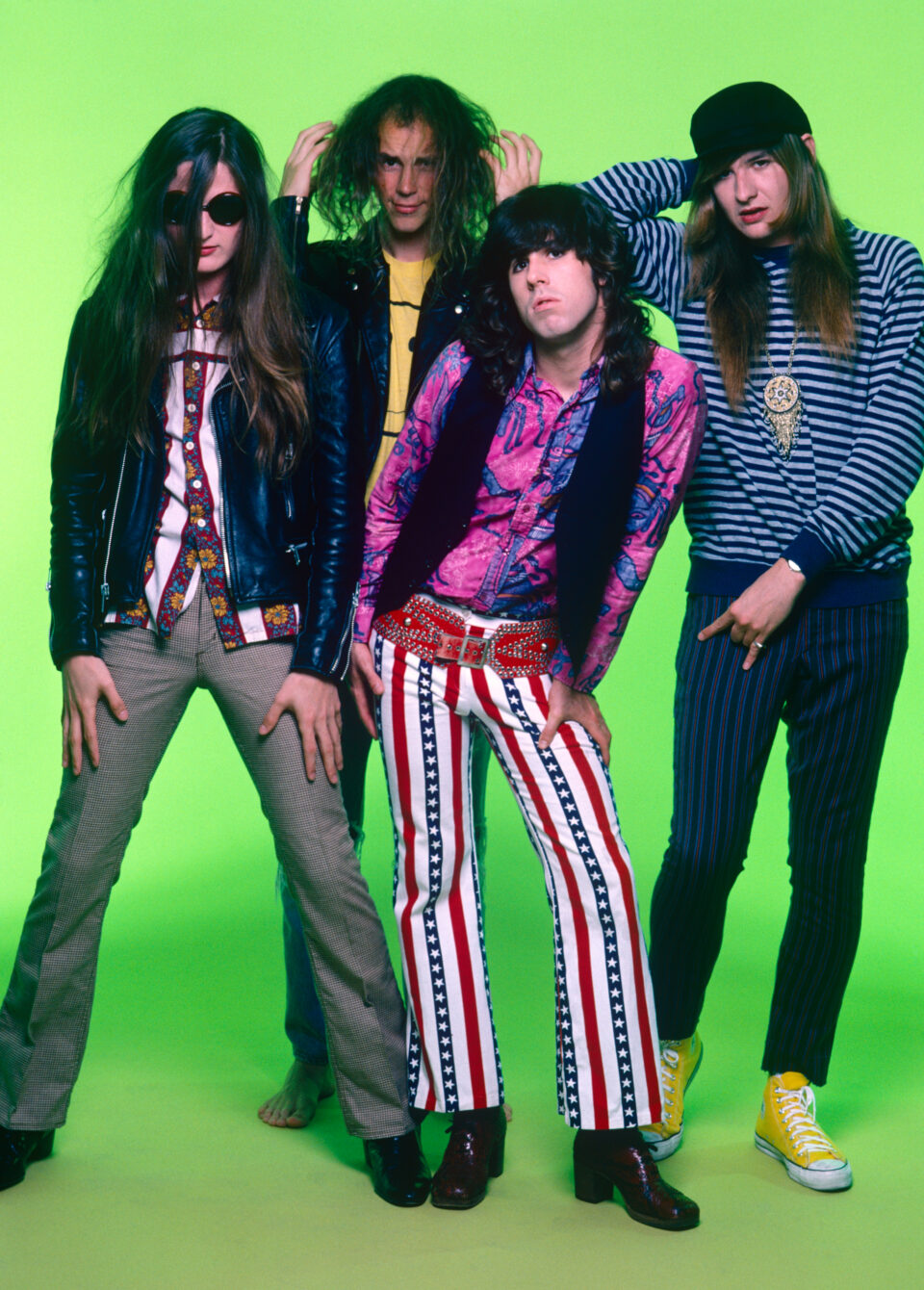
Redd Kross, Los Angeles, California. 11 May 1987. L-R: Steven McDonald, Robert Hecker, Roy McDonald, Jeffrey McDonald.

